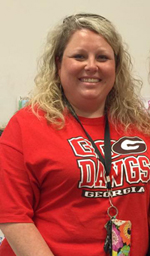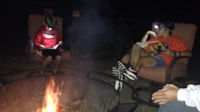 “Mom, I wish I could read like the rest of my family,” said my seven-year-old grandson, Zach. “Keep practicing because once you learn how to read, you can do anything,” his mom replied.
“Mom, I wish I could read like the rest of my family,” said my seven-year-old grandson, Zach. “Keep practicing because once you learn how to read, you can do anything,” his mom replied.
And practice he did, spending many hours with his dad, Tim, and other family members reading out loud to them. All of a sudden, it seemed as though Zach caught onto this “reading thing” and it has become one of his favorite things to do.
Unfortunately, that is not always the case with some children. Many children struggle in learning how to read, leaving them very frustrated.
My guest writer today, Laura Croom from Athens, Georgia is a certified reading teacher who knows first-hand the struggles many children face in learning to read. I know you will be enlightened by her knowledge as a reading specialist, and especially her love for her students.
It’s the beginning of your second grade year. You were top of your class in Kindergarten. You started having some problems keeping up in First Grade. Now you’re really behind your peers and the benchmark is set for you. You know your teacher has talked to your parents. Your parents care and are willing to do whatever it takes to help you succeed. Your teacher has agreed to tutor you after school.
You get your first progress report. It says unsatisfactory in reading. The teacher does not think about you seeing it and being totally devastated. She just assumes your parents will look at it and move forward with the goals they have set for you. You cry because you’re so disappointed. Your mother tries to calm you down and tell you it will be okay. But you know you didn’t do well and your self-esteem is ruined. You go in your room and write a note to your mom. It says, “I am bad at reading books.” Your mom and teacher text back and forth trying to figure out a way to help you feel better as well as help you learn.
After many weeks of one-on-one assistance, you begin to improve. You are reading on grade level. You recognize as many sight words as your peers. Your fluency rate is still a little slow, but it has definitely improved. You have earned 24 Accelerated Reader points. Things are starting to click. Your self-esteem is higher, and you are proud of yourself.
The above is a true story. I have been teaching for 14 years. This isn’t the first time I have dealt with a struggling reader. However, it is the first time I realized the student’s severe frustration and devastation. This child broke my heart. I hated the fact she felt so bad about herself and her ability.
Prior to sending the progress report this quarter, I spoke with her parents. We discussed issues she had the previous year and was currently having. We decided that one-on-one tutoring would be the best way to deal with her problems. I did several diagnostic tests to determine the best course of action. After looking at the data, I determined the child had a significant phonological weakness. She knew an average amount of sight words for her age and reading level. She exceeded in listening comprehension, but reading comprehension level was extremely low. The data only showed what I knew to be true about the student’s abilities. With all this information in hand, I made a plan to help the student become a more successful reader and build her self-esteem back up.
We went to work! For six weeks, the student has received small group reading instruction five days for 35 minutes per day. This instruction included reading leveled text and answering comprehension questions about the text, Reading Mastery, Sweet Phonics and sight word recognition. She also received one-on-one instruction after school three days a week for 45 minutes. During these sessions we worked on grammar skills, leveled text, comprehension, sight words, decodable readers, and Accelerated Reader. Her parents provided her with extra support from home. They read leveled text and trade books to her, with her, and listened to her read them. They practiced sight words and writing. Needless to say, we succeeded and met our goal for the end of the first quarter of school.
She is currently reading above the benchmark, and she knows more than the required amount of sight words. Her fluency rate shows that she is reading slower than her average peer, but she is reading fast enough to comprehend and enjoys reading. In my book, that is all that matters!!!
I share this story with you for many reasons:
- I want teachers to realize some students are giving all they’ve got, but need more support to be successful.
- I want parents to realize reading is a difficult skill to master especially if you struggle to read.
- The most important lesson anyone can take from this story is that teachers, parents, and students have to give 100% for children to be successful readers. I’m a firm believer that reading, writing, math, science and social studies go hand in hand.
Thank you, Laura, for bringing to light an issue many children face. Clearly, your love for your students shines through as you walk the extra mile with them in their struggles of learning to read.
Laura’s Bio
 I’ve been teaching 14 years. I have a specialist degree. I have endorsements in gifted, ELL and reading. I taught kindergarten for 6 years and second grade for 2. I teach in a rural community much like the one where I grew up in Donalsonville, Georgia.
I’ve been teaching 14 years. I have a specialist degree. I have endorsements in gifted, ELL and reading. I taught kindergarten for 6 years and second grade for 2. I teach in a rural community much like the one where I grew up in Donalsonville, Georgia.
(An added note) Laura is my cousin, and I am so proud of her. Not only does she root for her students, but she is an avid Georgia Bulldog fan.
 Back to Zach, along with a word from his mom, Crystal: “I am so proud of Zach and his discovery that he can now read. In fact, I am proud of both my children. Hannah has been an excellent example for her brother for reading. She loves it. When on Friday night, your children want to sit by the fire pit, and read, you know you are creating memories and growing their mind.”
Back to Zach, along with a word from his mom, Crystal: “I am so proud of Zach and his discovery that he can now read. In fact, I am proud of both my children. Hannah has been an excellent example for her brother for reading. She loves it. When on Friday night, your children want to sit by the fire pit, and read, you know you are creating memories and growing their mind.”
 Zach’s Bio
Zach’s Bio
Zach is in the second grade. Not only does he love to read, but he is quite a soccer player. Another special gift he has is his sense of humor, which brings so much joy to others.










Struggling with all the males in my family, husband, son, and grandson,not Zach, I know all to well how hard this is. A parent and teacher have to just keep looking till you find the key to the way that child can learn to read. Thanks Martha.
Struggling with all the males in my family, husband, son, and grandson, not Zach, I know all to well how hard this is. A parent and teacher have to just keep looking till you find the key to the way that child can learn to read. Thanks Martha.
Drue, aren’t you glad we have teachers like Laura who will go the exra mile to help children who struggle learning to read! I am thankful Zach is now pushing ahead; proud of him.